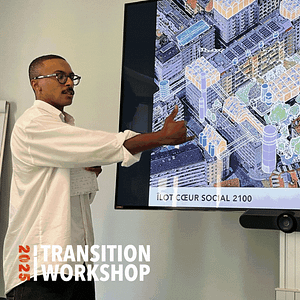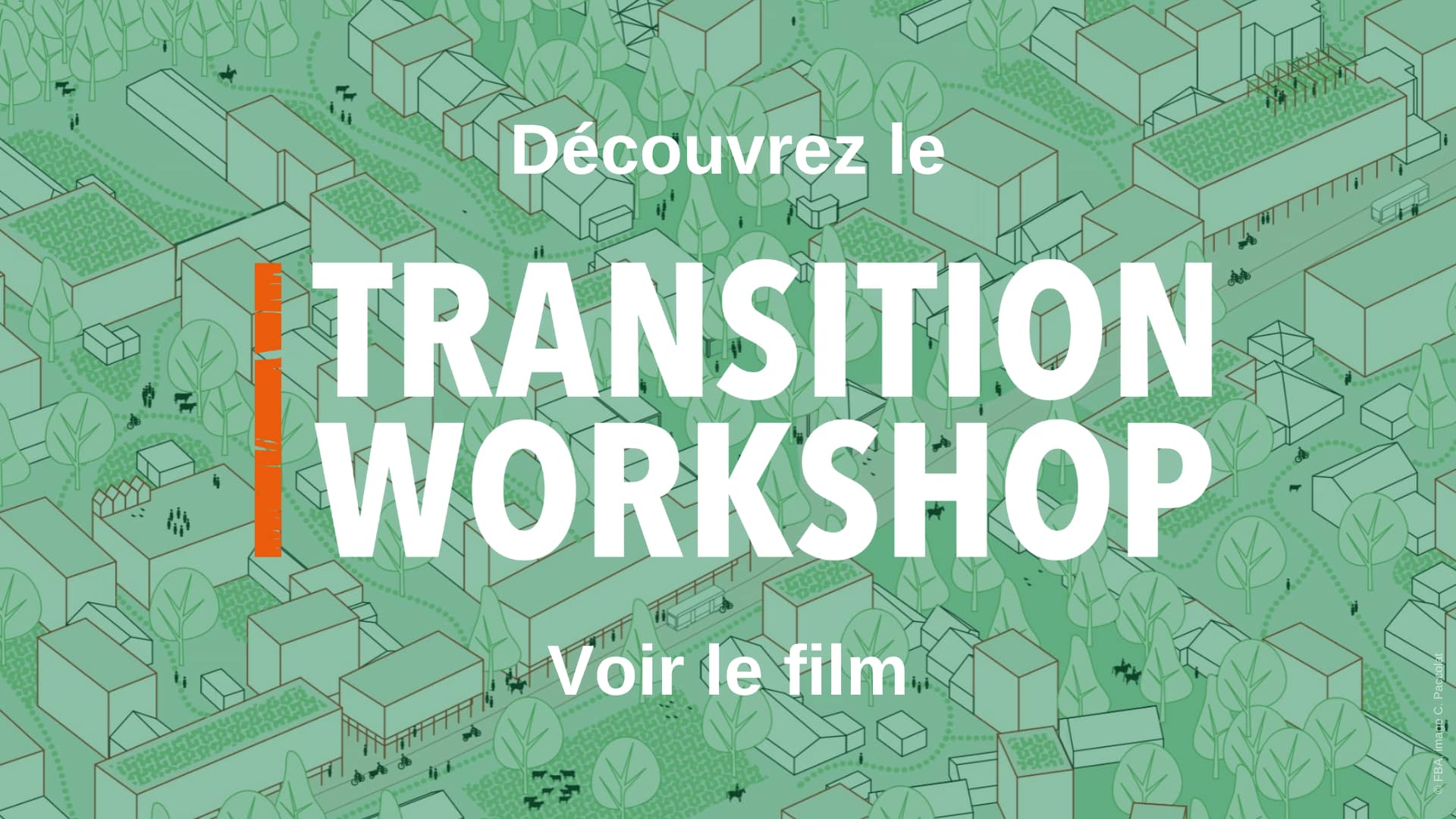No products in the cart.
Développement professionnel continu
en transition écologique urbaine et territoriale
- Outils et dispositifs en prospective stratégique pour des modes de vie décarbonés et résilients
- Théorie et pratique au croisement des disciplines du projet, des sciences de l'environnement et des sciences humaines et sociales
Inscriptions 2026 ouvertes
Transition Workshop, la formation multidisciplinaire et intensive unique en son genre qui vous transforme en agent du changement! 2 modules complémentaires, 3 formules pour appréhender la transition écologique des villes et territoires:
- Theory Masterclass (80h)
- Design Studio (80h)
- Formation complète (120h)
Félicitations aux participant·es du Design Studio 2025!
Le Design Studio 2025 s’est achevé vendredi passé, après une journée complète de présentations des travaux aux représentant·es du Canton de Genève et de la Ville de Genève, ainsi que d’un jury composé d’architectes et spécialistes de la ville.
Félicitations aux équipes qui ont traité le quartier de Plainpalais-Place des Augustins au prisme des ressources, des modes de vie et du vivant! Leurs recherches et travaux feront l’objet d’une publication de recommandations remise à l’Office de l’urbanisme du Canton de Genève, puis d’une présentation publique en novembre prochain.
En attendant cet ultime rendez-vous, les candidatures pour l’édition 2026 du Transition Workshop sont ouvertes!

Gwenaëlle Zunino – Architecte-urbaniste, Enseignant-chercheur à l’école d’architecture de Nancy et ancienne participante du workshop 2020
Qu’est-ce que le Transition Workshop vous a apporté? Les participant·es nous répondent
Croissance verte ou décroissance? Intervention lors de la session Le Facteur Humain
Première visite du quartier retenu pour le Design Studio 2025
Eaux, sols, terres, climats: Quels défis à relever pour des villes durables? Plongez dans la Theory Masterclass
Design Studio 2024: l’aftermovie
Présentation du Transition Workshop
L’exercice 7mm, c’est quoi?
Vincent KAUFMANN – EPFL
Gregory Giuliani – Maître de conférence à l’Université de Genève et Keynote speaker au Transition Workshop
Gwenaëlle Zunino – Architecte-urbaniste, Enseignant-chercheur à l’école d’architecture de Nancy et ancienne participante du workshop 2020
Qu’est-ce que le Transition Workshop vous a apporté? Les participant·es nous répondent
Le dérèglement climatique met au défi le futur des villes et des territoires.
Architectes, urbanistes, ingénieurs, administrateurs et chercheurs élaborent de nouveaux modes de vie.
La Fondation Braillard Architectes vous invite à une expérience formative unique pour vous offrir une boîte à outils inédite de la transition écologique.
“La transition écologique s’impose à nous pour régler les enjeux climatiques.”
Sylvain Ferrettidirecteur général, Office de l'urbanisme, Canton de Genève « La sagesse des villes s’est presque entièrement centrée sur les problèmes des relations humaines, contrairement à la sagesse de tout groupe indigène, où les relations avec le reste du monde animé et inanimé occupent toujours la place qui leur revient. »
James Lovelockpenseur et scientifique écologiste (1919 – 2022) “Une lecture pluridisciplinaire est une prise en compte transversale de tous les domaines qui sont concernés par la lutte écologique.”
Noéliedoctorante en architecture – Transition Workshop 2022 "Merci à tou·tes les intervenant·es pour la qualité des présentations au cours des 4 masterclasses théoriques. Le sujet de la transition est vaste et complexe, parfois anxiogène. C’est pourquoi il est essentiel de disposer d’informations fiables et spécialisées, pour essayer d’y répondre concrètement et sincèrement. Hâte de passer au projet!"
Lucienarchitecte-urbaniste – Transition Workshop 2025 “Le Transition Workshop a été une belle révélation pour moi. Au-delà de la richesse des interventions et de la stimulation intellectuelle apportée par chacun·e, je trouve que l’ambiance est superbe: dynamique, accueillante, on s’y sent vraiment bien. Je me réjouis de la suite!”
NadjaBRB & Marketing Manager – Transition Workshop 2025 “La transition écologique s’impose à nous pour régler les enjeux climatiques.”
Sylvain Ferrettidirecteur général, Office de l'urbanisme, Canton de Genève « La sagesse des villes s’est presque entièrement centrée sur les problèmes des relations humaines, contrairement à la sagesse de tout groupe indigène, où les relations avec le reste du monde animé et inanimé occupent toujours la place qui leur revient. »
James Lovelockpenseur et scientifique écologiste (1919 – 2022)
 Fondation braillard architectes
Fondation braillard architectes






